Cross Ange: Rondo of Angel and Dragon (2014)
Episodes 01- 25
They stole her life. Her family and her humanity … now she’s going to make their world burn!
Monolithic dragons, bad-ass babes and mode-altering mecha; three things that instantly come to mind when reflecting on Cross Ange, an original anime television series which mixes sleek mecha-mayhem with explicit violence and heavy fanservice, the show aimed squarely at the male demographic.
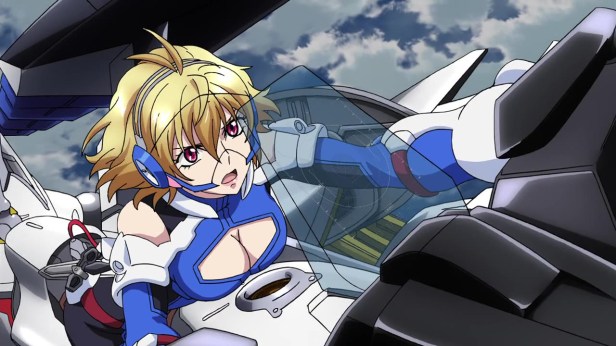
Truth be told, it was the able-bodied designs of the skimpily dressed female pilots that initially tweaked my interest, the titular heroine (Ange) being a shapely, platinum-haired honey whose lady-like physique screamed ‘sexy and stylish’ — my kinda gal. Curiously, however, Cross Ange isn’t solely about boobs, butts and smokin’ hot bods, the narrative quite intelligent and oddly astute, offering up a well-structured and compelling storyline with cheeky humor, nerdy romance and a considerable amount of character depth, all of this wedged in amongst the visually sharp, brilliantly animated action.
Produced by Japanese animation house Sunrise — the studio behind international hits Mobile Suit Gundam (1979) and Cowboy Bebop (1997) — and directed by Yoshiharu Ashino, D.Gray-man Hallow (2016), Cross Ange: Rondo of Angel and Dragon is set in the fictional Empire of Misurugi, an idyllic utopia free from war, famine, pollution and poverty; this prosperity made possible, thanks to a magic-like ability called ‘Mana’ — or Light of Mana. As it turns out, mankind have advanced (and evolved) to the point where Mana had become near universal, its simple existence allowing humanity, as a whole, to coexist in peace, freedom and uninterrupted harmony. Still, there were those who were born without the ability to use or harness this ‘power,’ the unfortunate few (who happened to all be female) ladled ‘Norma.’ Considered ‘monsters’ by society at large, the Norma were outcast (most, at a very young age) and exiled to a remote island fortress named Arzenal, a cold militaristic type stronghold, where they lived out their days protecting Earth’s citizens from draconic invaders (known as DRAGONs), the girls learning to battle these beasts using massive pilotable mobile weapons known as Para-mail.
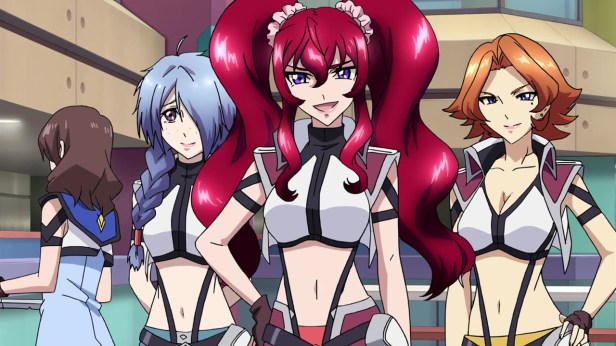
Enter squeaky-clean Angelise Ikaruga Misurugi, the much-loved First Princess of said Empire, who, too, was convinced that all Norma should be imprisoned and sent away — after all, their existence was a threat to the humanity, was it not it? Alas, on the day of the Princess’s 16th birthday gala celebration, the privileged Angelise is publicly exposed as a Norma by none other than her callous, overambitious brother Julio, who betrays his sister in order to usurp the throne. Shocked by the revelation, Angelise is immediately declared an abomination and thus imprisoned, the once adored noblewoman now a target of hate.
With Julio determined to cleanse the royal bloodline and restore the kingdom’s former purity, Angelise is shipped off to Arzenal to become a soldier, the dignified young lady stripped of her inheritance and all that she knows, including her name. There, the newly dubbed ‘Ange’ eventually learns to toughen up, accepting ‘who’ and ‘what’ she truly is — a Norma. Rolling with the punches (though still struggling with her newfound identity), Ange slowly but surely begins to show signs of promise, proving her worth as a warrior, this angering several fellow recruits — scenes of Ange thwarting a number of bullying attempts inject some well-timed humor into proceedings (the show, at this point, being rather grim). As Ange’s stormy new life takes one unexpected turn after another, our heroine steadily embarks on a mission to discover the hidden truth behind the ugly and prejudice society in which she exists, the fallen princess setting off on a near-impossible quest to correct all the world’s wrongs, and get back at those who cast her out.
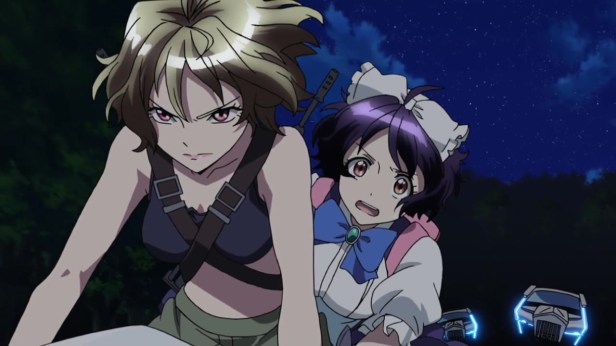
Written by Tatsuto Higuchi, The Girl Who Leapt Through Space (2009) — who, along with the script, also fashioned the series composition — Cross Ange works best when the narrative hones in on the malevolence of man and the bitterness of human relationships (think betrayal, selfishness and jealousy). Exploring heady themes of bigotry and oppression — timely, considering the hostile political climate over in the U.S.A. — Cross Ange can be raw, rough and, at times, rather challenging, the series artfully illustrating the negative aspects of human nature, and just how easily level-headed individuals can be swayed into accepting the cynical, hate-mongering view of the masses (this, overtly evident within the show’s preliminary episodes); a heart-breaking detour that sees the headstrong Hilda (a crimson-haired twin-tailed Norma) venture home to reunite with her mother, which she was snatched from, demonstrates this nicely. One can’t deny the obvious parallels to a Nazi occupied 1930s Germany — the persecuted, here, defined by their lack of ability rather than their race — with the tyrannized forced to support the totalitarian state they were wronged by, defending the people of Earth from hostile DRAGON attackers who appear through mysterious dimensional portals in the sky.
It’s kinda ironic, then, that our protagonist, Ange, is introduced as a proud and pompous, narrow-minded bigot — risky stuff, given the fact that this character may initially rub audiences the wrong way. Beaten and broken, Ange, having fallen from grace, quickly learns to stand on her own two feet, going from a bitter, disconsolate loner to a resistant, fiercely independent champion — one who refuses to play by anyone’s rules but her own. Surprisingly, however, by the show’s end (and thanks to some rock-solid writing), viewers may even find themselves rooting for Ange without feeling obligated to do so. What’s more, Ange comes across as ‘real;’ she’s a tough cookie with a mettle resolve who still seeks emotional aid form her friends and comrades, Cross Ange relying on relationships to frame the bigger, bolder beats, the drama driven by emotional dialogue as opposed to expositional — even at the expense of becoming too hard to follow, the story sometimes too muddled due to a lack of clear exposition.
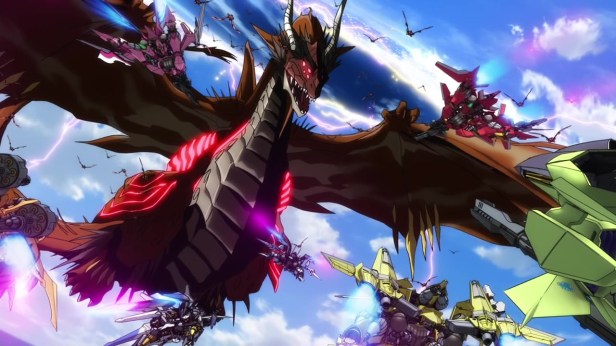
Nevertheless, the narrative eventually drifts into the realm of the fantastical, the anime’s second portion advancing its reach beyond the limited view of Ange, and the colony of outcasts in which she resides — wandering into the territory of parallel universes, hybrid-human dragonoids and immortal deities. While still gripping and imaginative, these later plot developments put a strain on believability, Cross Ange (in my opinion) thriving most when exploring relatable subject matter and real-world ideas. There are also a handful of questionable scenes in this latter half which hinder the series’ overall credibility; particularly a couple of impactful near-deaths (obviously added to pull on the heartstrings) — titbits the already intricate storyline could have honestly done without — these apparently ‘deceased’ characters re-emerging in the very next episode with literally no explanation as to how they survived.
Populated by a mountain of multi-faceted characters, we’re introduced to a plethora of players throughout the series — too many to list here. The all-girl Norma combatants (mid-to-late teens who look closer in age to twenty-year-old women) are given fully-fledged arcs, the bonds that make and break these ladies wholly fleshed and rigorously explored; there’s the eventual Captain of Ange’s troop, Hilda, who gradually reveals her true feelings for (and full attraction to) Ange, this lesbian storythread, while somewhat sensationalized, still told with a hint of sincerity and heart; the diligent and motivated Salia Tereshkova, whose jealousy over Ange’s promotion causes the purple-haired vixen to abandon her allies and switch sides, Salia going on a journey to discover her own lost sense of self-worth; then there’s foe-turned-ally Salamandinay (Sala for short) — a ‘new’ breed of Norma, so to speak — who ultimately grows to become Ange’s first true friend, both girls equal in spirit, strength and competitiveness, their chemistry fresh and authentic.

We also meet Ange’s personal maid, Momoka, a non-discriminating Mana user whose unwavering loyalty to her master, Ange, remains impenetrable, even in the face of scorn. And of course, there’s our chief antagonist, the womanizing Embryo, a once kind man whose obsessive pursuit for world peace transformed him into a self-assuming, supreme-like figure with a god-complex, this long, flaxen-haired master-manipulator an ideal adversary for the unbreakable Ange, Embryo yearning to shatter and control the unshakable by whatever means possible: degradation, seduction and torture of the body and mind. Last, but certainly not least, is male love-interest Tusk, whose ever-growing relationship with Ange matures as the series unfolds, the skilled mechanic, who meets Ange through a chance encounter, going on to become a bona fide knight and a real charmer, despite his tendency to ‘accidentally’ face-plant into Ange’s nether regions.
On that crass note, Cross Ange delights in dishing out fanservice — from the body-hugging plug-suit uniforms to the endless shots of T&A, the camera often lingering on tightly framed images of bosoms, bums and semi-exposed crotches, Ange being stripped down to her birthday suit in a large number of episodes. Be that as it may, the nudity in Cross Ange is somewhat ‘undefined’ — think animated Barbie dolls — the girls illustrated with fully exposed breasts but no drawn on nipples, this state of undress almost harkening back to anime days of old, where this sort of ‘vague nudity’ was considered the norm. As a result, the nudity here feels far less gratuitous and seems to serve the narrative. However, there’s no shying away from explicit sex scenes — both lesbian and hetero, conceptual sex and rape — while a couple of unflinchingly brutal sequences, which fuse sex with violence, could prove to be too difficult a sit through for some — there’s a scene where a meagerly-clothed Ange gets viciously lashed by her younger and sadistic, wheelchair-bound sister, along with an objectionable body cavity search, this sequence causing a stir of controversy upon Cross Ange’s initially airing.
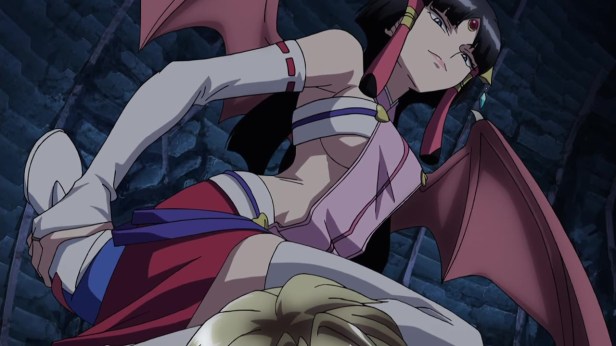
Over on the technical side, Cross Ange is first-class! Would you expect anything less from studio Sunrise? The animation here is smooth, crisp and fluent — with mecha and non-mecha action striking and thrilling in equal measure — the backgrounds detailed and the CGI elements (mainly DRAGONs and Para-mail) seamlessly integrated into the artwork. The characters themselves aren’t your stock-standard anime designs either, Ange, with her strong athletic build, tough rosy eyes and long golden-hair (which is cut short then slowly begins to grow back), certainly stands out in the crowd. Other visual components, such as the Para-mail — being both intricate and convincing — are handled excellently, too, these weaponized vehicles created by Junichi Akutsu, who (interestingly) designed the mecha for Code Geass: Lelouch of the Rebellion (2006).
In addition, the soundtrack in Cross Ange is hugely energetic and dramatic, the score — made up of soft piano melodies, intense synthesized tunes, orchestral booms and ominous backing vocals — bringing about a tribally European/ Japaneasy type flair, one that combines a number of distinct flavors of sounds. The two openers, ‘Forbidden Resistance’ by Nana Mizuki and ‘The Apocalypse of Truth’ sung by Yoko Takahashi, are dynamic and lively, while the closing tracks, ‘Rinrei’ by Eri Kitamura and ‘Shūmatsu no Love Song’ once again performed by Nana Mizuki, complement the series fittingly, each accompanied by stirring yet suitable images which more or less ‘mirror’ what’s in store.
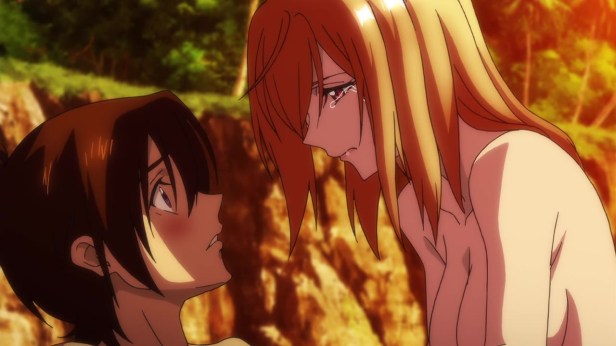
Certainly one of the better looking mecha shows in recent memory, Cross Ange, despite its few flaws, is a tightly scripted, well-realized self-contained anime. With its expansive worldview, memorable characters and a kick-ass female lead, along with comprehensive designs and an enthralling narrative — one that’s punctuated by impressive action set pieces — Cross Ange certainly delivers — proceedings wrapping up rather tidily, too, with no annoying loose ends. All the same, those seeking a lighter Harem-type anime should probably look elsewhere, as Cross Ange is wild and turbulent, sitting right on the edge of extreme, the series overly graphic and brazenly risqué, tackling some pretty prickly subject matter, too!
3.5 / 5 – Great
Reviewed by S-Littner
Cross Ange: Rondo of Angel and Dragon is released through Madman Entertainment Australia